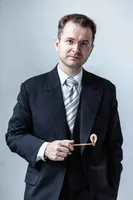
DIVINE POEM
Košice State Philharmonic
Zbyněk MÜLLER , conductor
Ladislav FANČOVIČ , piano
Program:
Ernő Dohnányi: Concerto for piano and orchestra no. 2 in C minor, Op. 42 30'
Alexander Scriabin: Symphony no. 3 in C minor, Op. 43 "Le Divin Poème" ("The Divine Poem") 53'
Dohnányi's two piano concertos are special examples of his compositional style, because he was a romantic in soul and compositional expression all his life. Although he died only in 1960, he had little to do with the musical development of the 20th century. Both of his concerts evoke a world that belongs to the nineteenth century. Dohnányi composed in a style deeply rooted in the Austro-German classical tradition, exemplified by Brahms. His merit as a composer is the fact that he was able to meaningfully extend the classical-romantic past, as one of its last representatives, into the 20th century in his chamber and orchestral music. He did it with elegance, wit and stylish virtuosity, and the two piano concertos are a great example of his remarkable mastery of form and instrumentation.
While in Scriabin's first two symphonies the author preserves romantic formal conventions, in the other three he has already gone beyond the symphonic scheme and creates free poems with a programmatic basis. In Symphony no. 3 was based on Tatiana Schlözerová's text with a theosophical background. Here, the composer wanted to musically portray the evolution of the human soul. The divine poem consists of three parts. It is romantic-expressionist music, expressing emotional and expressive states. Musically, he follows the tradition of selected authors such as Chopin and Wagner. The construction material of the work is relatively simple and foreshadows Scriabin's last piano sonatas and Symphony no. 5 Prometheus, works of high expressionism. Thematic basis of Symphony no. 3 consists of small, detailed motifs, which become the basis of building an emotionally impressive and powerful form.
